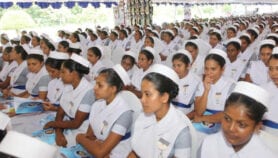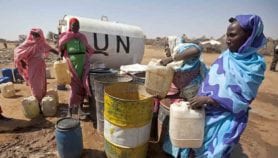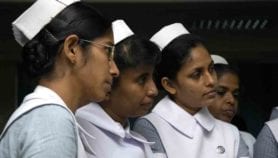By: Nicky Lewis
Send to a friend
The details you provide on this page will not be used to send unsolicited email, and will not be sold to a 3rd party. See privacy policy.
Professor David King, chief scientific advisor to the UK government, spoke yesterday (12 September 2002) to participants at the British Association’s festival of science about the outcomes of the World Summit on Sustainable Development (WSSD) that was held in Johannesburg earlier this month. The session was organised by SciDev.Net.
Moving forward with sustainable development
Professor King was upbeat about the outcome of the Summit, saying that it offered a critical “staging post” in the continuing international process.
He cited success stories of the past 15 years that include the Montreal protocol on ozone depletion and the Kyoto Protocol to reduce greenhouse gas emissions. The latter was ratified by China at the WSSD — an important step towards its entry into force, which many hope will take place later this year.
King said he was not overly worried that science did not feature significantly in the text of the political declaration agreed at Johannesburg, but looked towards partnerships as a way to progress the scientific agenda.
“Having established the broad principle in the political auditorium, we should get on with bilateral agreements and partnerships,” he said. These will be important even if all 189 countries did not endorse them at the WSSD.
Building scientific capacity
There is no doubt that developing nations lag significantly behind the rest of the world in scientific capacity. On the investment front they are well behind OECD countries, which now invest 2.3 per cent of their gross domestic product (GDP) in scientific research and development.
And scientific output — for example, in terms of publications in recognised journals — is similarly poor. “Very little high level science activities are going on in many countries in the developing world,” King said.In order for sustainable development to be emphasised in any given country, growth of local capacity will be essential. King underlined the important role that developed nations must play in assisting with such capacity building.
For example, Europe “needs to look at mechanisms for transferring knowledge from north to south,” he said. Seemingly straightforward issues such as access to scientific reports and publications are far from trivial for developing countries.
It is within this context that type 2 outcomes of the WSSD will be important. King described the African Institute for Mathematical Sciences (see Top maths institute to stem Africa’s brain drain) — which has been spearheaded by UK-based cosmologist, Neil Turok — as a good example of how local scientific capacity can be achieved.
But financial support is also necessary. “The bottom line is that funds are required to pump-prime these activities,” he said.
King was confident that it is possible to “build a lasting impact” from capacity-building initiatives. He reflected on India’s success following Independence. From initial investment in the Indian Institute of Technology in 1949, the country has developed tremendous strength in science and technology, and now leads the world in computer software technology.
Slowing the brain drain
A key obstacle to achieving sustainability in the developing world is the flight of top scientists, engineers and technologists to countries that have a demand their skills, and that are able to offer attractive salaries.
“If you keep draining off from the top you won’t sustain the stream,” King said. “What we would like to achieve is a blockage of the current brain drain.”
Key to slowing the brain drain, he said, is recognition by governments of the importance of science in policy-making. Developing nations must “exploit science, engineering and technology for local benefit,” he said.
The Abdus Salam International Centre for Theoretical Physics in Trieste, Italy was named as an excellent example of a way to address this problem. Set up in 1964, the centre enables developing-country physicists to get exposed to top-level science from Northern countries. “We should see if we can set up Trieste type institutions in developing countries,” King said.
Climate change – a key issue
Looking beyond Johannesburg, King highlighted climate change as possibly the most important issue. “It has to be top of the agenda for sustainable development,” he said.
Climate change clearly poses a serious dilemma for developing countries that currently lack sufficient energy provision, but at the same time are being pressured to adopt sustainable, non-fossil fuel technologies.
He said that it is essential for close north-south contact in this area, particularly within the context of technological ‘leapfrogging’. Southern countries should be helped to apply existing technologies, rather than having to develop them from scratch.
King was disappointed that no numerical targets for renewable energy were agreed at Johannesburg. But the international community does agree on the need for substantial increases in renewables, he said, and this is clearly an area that demands scientific input.
© SciDev.Net 2002













